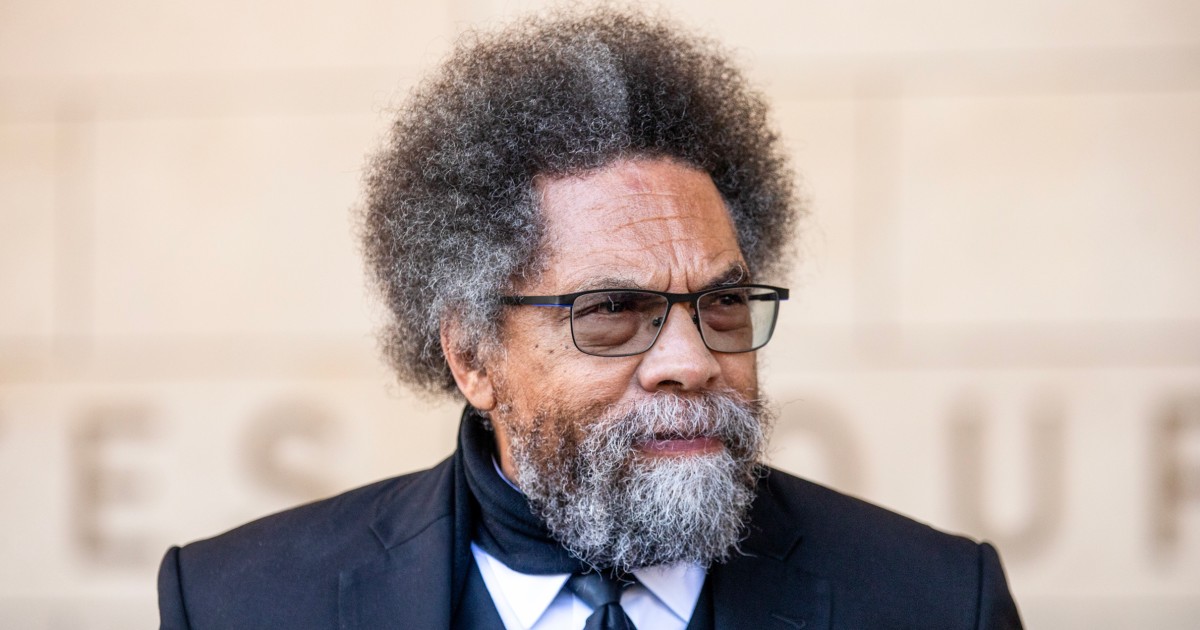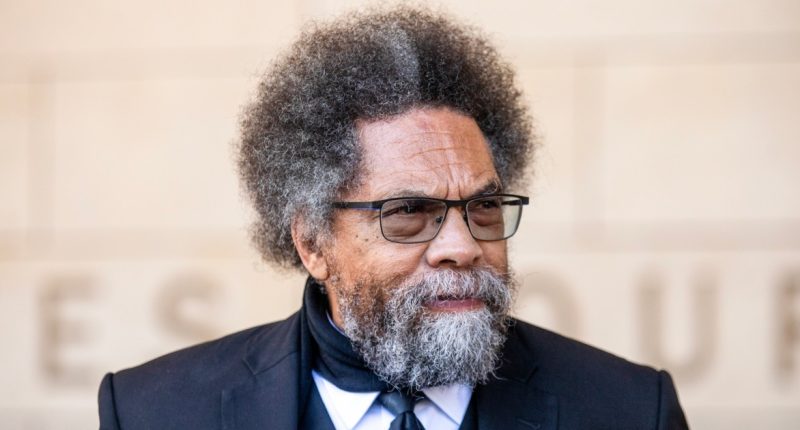
Running for president is hard. Running for president without the backing of a major party is even harder — a reality Cornel West is only beginning to confront.
The famed philosopher’s independent presidential campaign has generated plenty of buzz, but it starts well behind in the herculean task of getting on the ballot in order to truly compete against likely Democratic and Republican nominees Joe Biden and Donald Trump.
That’s one of the big unanswered questions hanging over the 2024 presidential race — for West and all of the other candidates who might be running. Third-party candidates are generating interest in early polls, but not only is it unclear whether that will last, it’s also unclear whether voters in different states will even have those candidates as options on their ballots in November 2024.
“We’re still in the embryonic stage,” West acknowledged in an interview with NBC News this week. “The last thing I want to do is have huge rallies now and peak too soon.”
West has only about 10 staffers (his wife helps handle media requests). He has conducted no internal polling. He has held only one public campaign rally. His bank balance is two digits shorter than those of his rivals — he’s raised hundreds of thousands so far while others have brought in tens of millions. And he’s sworn off outside help from a super PAC which could have helped make up the difference.
Still, with a degree of national name recognition and an electorate interested in alternatives, West says he is in it to win it and committed to staying in the race through Election Day.
How he gets there — or grows his tiny support base to something approaching a broad winning coalition — is not set to follow any carefully constructed plan.
“I’m a jazz man. I believe in improvisation,” West said. “I’m trying to just learn, listen, be jazz-like enough to improvise while holding on to my integrity and honesty.”
Stark math
After cycling through two different minor parties and at least as many campaign managers in the earlier stages of his campaign, West is beginning a more public phase, which will include a trip to Michigan next week to tap into Muslim and Arab voters’ displeasure with Biden over his steadfast support for Israel during its war against Hamas in the Gaza Strip.
He’s just started holding fundraisers and knows he’ll need to start raising more money — a lot of it. West reported raising just $320,000 through the end of September.
By contrast, another independent presidential candidate, Robert F. Kennedy Jr., whom West calls a “complicated brother,” raised more than $15 million for his campaign, while an allied super PAC has millions more.
Meanwhile, the Green Party, whose nomination West briefly sought before deciding to run as an independent, is already on the ballot in 19 states.
As an independent, it’s now entirely up to West and his team to get his name on the ballot in every state — each of which have their own unique rules, requiring some combination of fees and signatures, with state-based restrictions on who can collect those signatures and where.
“When you start adding up what it’s going to take nationally, at a minimum, you’re getting into millions of dollars,” said one longtime political campaigner who has overseen independent campaigns and requested anonymity to speak candidly. “The truth is some people won’t make it.”
West said he would focus first on states with early deadlines and the “low-hanging fruit” — states with lower fees and signature requirements — before turning his attention to larger ones with higher hurdles, such as Texas and New York.
Some swing states have relatively low thresholds, meaning minor candidates like West could still prove pivotal in a close presidential contest even if they don’t get on the ballot everywhere. Wisconsin, for instance, requires only 4,000 signatures to make the ballot, while Pennsylvania asks for 5,000, plus a $200 fee. Biden won Wisconsin by 0.6 percentage points and Pennsylvania by 1.2 points in 2020.
West’s goal, he said, is to get on the ballot in 15 states by March and 30 to 35 states by June, with the hope of getting on all 50 by November, though he said he would be happy to end up on 40 to 45 state ballots.
Some Democrats have worried that West could pull support away from the left for Biden. But critics doubt whether his campaign and West himself, who has never run for public office, are up to the task.
“The reason we’ve been so worried about No Labels is that they have had the money, time, and organizational power to get on the ballot in many states as a third party,” Matt Bennett of the centrist Democratic think tank Third Way said referring to the deep-pocketed centrist group preparing for a potential third-party presidential campaign.
“But an independent candidate getting in now faces a much higher hurdle,” he continued. “If an independent candidate hopes to get on the ballot in one or two states to serve as a spoiler, that may be doable. But there’s very little chance they could get on ballots everywhere (or even most places) to make even a remotely plausible case that they’re in it to win.”
Richard Winger, co-editor of Ballot Access News, which supports third parties and independent campaigns by providing useful information about arcane ballot access rules, said West would have been better off sticking with the Greens.
“He would have had a way easier time because the Green Party is just about turning in their petition in Arizona. They’re already on in California and Texas and Florida. So there he would have had four of the hardest six states. For free. And he gave it all up,” Winger said.
Winger estimated that an independent candidate will need to collect at a minimum 900,000 signatures nationally to appear on ballots across the whole country. Estimating a cost of about $5 per signature, he said a bare minimum budget would be $4.5 million. But costs can climb to $12 per signature in some places, and campaigns need to collect more than the required number of signatures since some will inevitably be deemed invalid by election officials.
“I would tell him with all my heart: You made a big mistake when you gave up the Green Party race,” Winger continued. “If you can stand the embarrassment, you should change your mind and there’s still plenty of time for him to seek it. Jill Stein is running for the Greens but she’s a friend of Cornel West. She would be delighted to step down if he’d come back.”
Stein did not respond to a request for comment.
Making the case for ‘viability’
Though only six months old, West’s campaign has already faced organizational shake-ups and accusations of mismanagement.
West started out running with the little-known People‘s Party before transitioning to the Greens. Stein, a previous Green Party nominee who is now running for president again with the party, briefly served as his campaign manager. She was replaced by former Hillary Clinton-turned Bernie Sanders-turned Marianne Williamson strategist Peter Daou, who left West’s campaign last month citing personal burnout and mental health.
“I saved Cornel West’s campaign,” Daou said on the social media platform X after he departed, “from financial insolvency and complete internal disarray.”
West’s improvisational nature can lead to confusion, including mixed messages about the launch date of his campaign, or the candidate arriving in Mississippi for a series of campaign events in August only to realize no one had booked a rental car, which led to a reporter driving the candidate around for the day.
The campaign is now run by a “quartet” of four co-managers.
Anthony Rogers-Wright, one co-manager and the campaign’s policy director, said his team fully understands the importance of demonstrating “viability” to convince supporters and quiet the skeptics.
“We have no illusions. This is a gargantuan task that we’re taking very, very seriously,” he said. “But we kind of reject Brother RFK Jr. saying that it’ll cost $30 or 40 million. We disagree with that.”
The campaign plans to accomplish its ballot access goals mostly through volunteers, by tapping into local organizations and independent candidates who align with West’s vision, in addition to building its own volunteer network, which Rogers-Wright said includes more than 20,000 people so far. He also said the campaign is already in talks with canvassing firms in some key states.
The campaign employed that model recently in Utah, where West held a rally with an independent candidate for mayor of Salt Lake City, who said he would turn over his organization to West’s campaign, according to Rogers-Wright.
The candidate, Michael Valentine, came in third in last week’s election, receiving about 3,100 votes out of roughly 45,000 cast, about 7%.
“We’re basically creating an independent slate of candidates and their supporters and their grassroots efforts across the country,” Rogers-Wright said.
In Nebraska, which West is visiting next, it will mean trying to piggyback off a signature-gathering effort to get an abortion measure on the ballot. And in Michigan, it will mean tapping into local networks of Muslim and Arab activists, some of whom have committed to defeating Biden.
Sanders, I-Vt., employed a similar strategy to help jump-start his underdog 2016 campaign, for which West was a prominent supporter and surrogate.
But Sanders was adamant about running inside the Democratic Party and ruled out an independent bid — despite encouragement from West and others — in part because of the immense ballot access hurdles.
West says he thinks Sanders would have won the 2016 election if he were the Democratic nominee. But could Sanders have won as an independent running against both Trump and Clinton?
“Probably not,” West admitted. “No, probably not.”
Source: | This article originally belongs to Nbcnews.com










